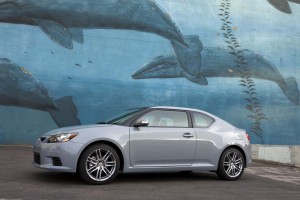
Save the whales? Scion may be billing itself as environmentally-friendly, but don't expect it to use battery power anytime soon.
Who says today’s young buyers want to go green? According to Scion, Toyota’s youth-oriented brand-within-a-brand, price trumps environmental leanings.
While the marque’s parent has become the top-seller of hybrids worldwide, with models like the Toyota Prius, Scion has “no plan” to get into the battery can market, the division’s General Manager Jack Hollis responded to a question from TheDetroitBureau.com.
Instead, the corporate strategy is to focus on keeping Scion prices down and letting Toyota come to market with the more expensive hybrid, plug-in and pure battery-electric offerings.
“We have no plan to expand into the hybrid side or to electrify” with products like the Nissan Leaf, Hollis said following the preview of the 2011 Scion tC coupe.
That model underscores the division’s strategy, Hollis explained, which is to come to market with vehicles under $20,000 that emphasize style and the efficient use of conventional internal combustion engine power.
The executive acknowledged that this might seem to fly in the face of current trends. While there’s a broad and expanding interest among American motorists in vehicles that use battery power to reduce fuel consumption, green technology is particularly appealing to Gen-X and so-called Millennials, research shows. That is precisely Scion’s demographic. It’s average buyer is just 37, and for the tC, in particular, it’s down around 26.
For Toyota, on the other hand, the typical customer is 57. Yet the brand has built a global reputation as a green leader, largely due to the skillful promotion of products like the Prius, the most popular hybrid-electric vehicle in the world.
“A lot of youth are green,” Hollis acknowledged, “and looking for new (battery-based) technology, but the preference of Scion is to benefit Toyota” by steering customers looking for hybrids and other electric-based vehicles to the parent brand.
Toyota itself is rethinking its electrification strategy. Barely a year ago the automaker seemed reluctant to go much beyond relatively conventional hybrids based on its Hybrid Synergy Drive system. But it now plans to have a plug-in version of the Prius on sale in North American by late Spring 2012. And it will unveil a new battery-electric version of the RAV4 crossover, dubbed RAV4-EV, at the upcoming L.A. Auto Show. Developed as part of a new joint ventures with California electric vehicle maker Tesla Motors, the RAV4-EV could be on sale by 2012.
(For a closer look at Toyota’s RAV4-EV and its plans to get into the plug-in market, Click Here.)
Targeted specifically at the U.S., Scion products are generally sold overseas under the Toyota badge, so there’s a strong likelihood battery versions might become available abroad. Could that lead Scion to be more open to electrification in the years ahead?
“We’re not saying we’re not going to look into electrification,” Hollis cautioned. But he stressed that the U.S. brand’s primary goal is holding down costs to $20,000 or less in order to win over those young, first-time buyers. That, he noted, is difficult considering the high cost of lithium-ion batteries and other electric propulsion hardware.
But, “as hybrid technology prices comes down, we’ll look into it,” Hollis added, emphasizing that such a move is “still a few years away” at the earliest.
(TheDetroitBureau.com tests the 2011 Scion tC. Click Here to read the review.)
